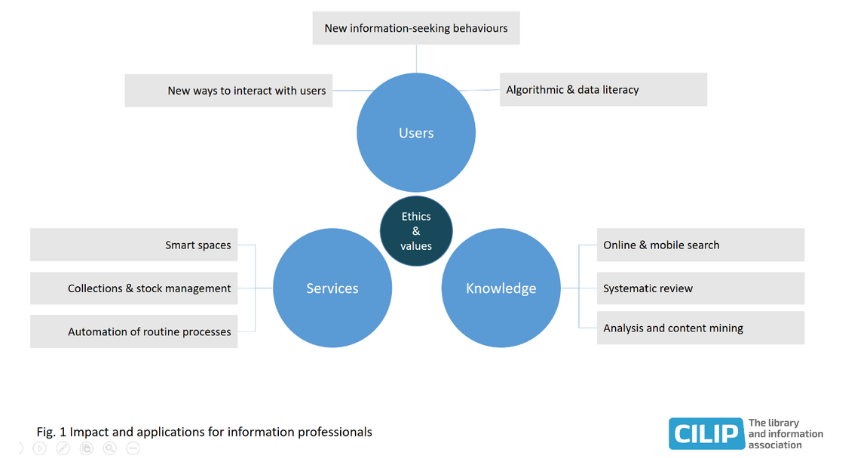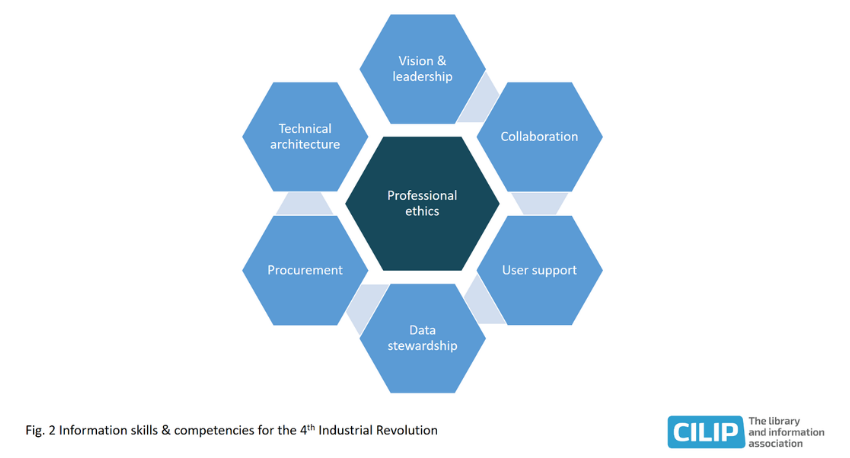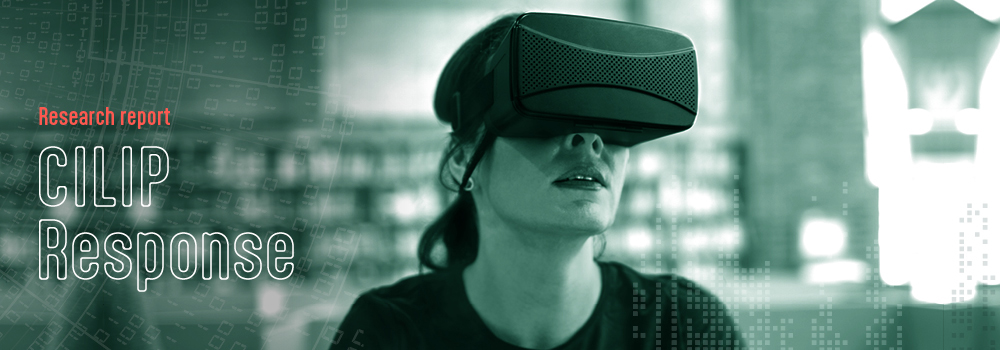CILIP response to Research Report: The impact of AI, machine learning, automation and robotics on the information professions
May 2021
Nick Poole, CILIP CEO
When in the early 1990’s science fiction author William Gibson said “the future is already here – it’s just not evenly distributed yet”, he was talking about the then-emerging technology of virtual reality.
Yet Gibson’s quote could be applied equally to the findings of this comprehensive new research, led on behalf of CILIP by Dr Andrew M Cox of the Information School at the University of Sheffield.
These technologies – AI, machine learning, process automation and robotics – as well as the ideas, concepts and practices that accompany them are not the stuff of some far-distant future. They are with us already, impacting our daily lives
in countless ways.
The second half of Gibson’s quote neatly defines the opportunity ahead for information professionals. Our role is to ensure that the societal, economic and industrial benefits of these technologies are evenly distributed. That they are accessible
and beneficial for every member of society, every community and every organisation.
Dr Cox has explored the implications of these technologies for our profession through three lenses – from the perspective of the knowledge, information and library workforce, from the perspective of skills and from the perspective of our shared
professional ethics.
Key findings
The Research Report itself presents a compelling and coherent narrative, situating AI, machine learning, process automation and robotics in the wider context of social and industrial change. As Dr Cox points out, they are as much ‘ideas’ as
technologies in their own right, with far-reaching implications for our profession.
We recommend engaging with the full report in order to get the fullest sense of what it has to tell us. However, there are a number of key findings which we would highlight here:
- These technologies are not coming, they’re already here. The processes of engagement, experimentation and mainstreaming are already well underway for information users;
- This transformation is impacting at every point in the supply-chain of knowledge and information – from content creation to research, selection to data analytics, these technologies depend entirely on the availability of high-quality,
well-structured information, data and metadata to function;
- There is a huge opportunity for our profession to position itself at the heart of this process, not as technologists but rather as trusted information professionals holding a range of roles:
- in leadership positions, taking the driving seat as organisations apply AI, machine learning, automation and robotics to deliver on business objectives;
- offering authoritative support to employers in all sectors to harness these technologies while minimising the risks;
- as a source of trusted and authoritative leadership for our users;
- As ethical information professionals, we have a vital role to play in democratising AI, machine learning, automation and robotics, ensuring that they are used to maximise equity, equality, representation and inclusion rather than deepening
the digital divide;
- These technologies are impacting first on high-value, high-volume tasks, but are quickly developing to address lower-value, more repetitive tasks. In the process they will remove the need for existing jobs, extend the remit of current
roles and also create new roles for information professionals comfortable with the technologies. These include envisioning their future use, commissioning systems, customising systems for local needs and generally bridging between
user needs, organisational purposes and the perspectives of developers.
- There is an urgent need to expand on the existing digital skills and confidence of the knowledge, information and library workforce to ensure that individual practitioners are well-placed to take on these new roles.
Impacts and Applications
The Research Report highlights a broad range of impacts and applications of AI, machine learning, process automation on robotics on the work of information professionals. These include:
- The transformation of search and knowledge retrieval
- New AI interfaces to existing knowledge systems
- New techniques for analysing and extracting knowledge from content
- New approaches to systematic reviews
- New tools for interacting with information users
- Approaches based on influencing user behaviour (raising significant ethical questions)
- Automation of routine administrative tasks
- Developing services in ‘smart’ spaces
- Automated management of physical book stock and materials

Information skills for the 4th Industrial Revolution
The research has highlighted a set of skills and competencies that information professionals will need to develop in order to support their users and organisations through the 4th Industrial Revolution, connected to CILIP’s Professional Knowledge and Skills Base (PKSB):
| Ethical decision-making |
- The application of professional ethics to new contexts
|
| Vision and understanding |
- Basic understanding of AI, machine learning & automation
- Leadership skills to harness new capabilities for existing services
|
| Collaboration |
- Building effective partnerships to enhance understanding
|
| Procurement |
- Enhanced understanding of copyright & IP in a new context
- Collections development to make use of new capabilities
- Selecting and implementing effective & accountable systems
|
| Data stewardship |
- Understanding and implementing good data governance
- Developing new strategies for preservation & continuity
- New techniques including data visualisation
|
| Technical infrastructure |
- Creating reliable information architecture for AI to work with
- Building accountability into systems to mitigate bias
|
| Supporting users |
- Help users develop their own skills and competencies in data & AI
- Provide expert advice on the use of enhanced tools & systems
|

Developing a joined-up approach
The research calls for a joined-up and coherent response from the information professionals, enabling us to maximise the benefits of AI, machine learning, automation and robotics for information users while mitigating the emerging risks.
The main elements of the response envisaged by the report are:
- Developing a shared vision of the role of information professionals in helping their users to benefit from these technologies;
- Working collaboratively within the profession and across other sectors to develop our knowledge and understanding;
- Improving our capability and expertise to help our organisations select, procure and implement these technologies for their users;
- Ensure that our use of these technologies is driven by accountable data stewardship, based on our professional ethics;
- Recognising that the effective and sustainable use of these technologies depends on good information architecture, metadata and knowledge organisation – core competencies of our profession.
Responding to the recommendations
The Research Report includes a number of specific recommendations for CILIP as the Chartered Institute which exists to support, unite and promote the information professions. The table below sets out how we propose to address them.
Recommendation
|
Action
|
| Develop and promote a shared vision of the role of the information professions in unlocking the potential of AI and machine learning through good data stewardship. |
The publication of the Research Report and our response mark the beginning of this process. We will work with other sector representative organisations and our membership to set out and advocate for a shared vision of the role
of information professionals. |
| Ensure the PKSB is aligned to the future skills needs associated with AI and robotics, including computational sense, data science, data stewardship and soft skills. |
This work is underway already. The Review Group leading the revision of the new Professional Knowledge and Skills Base (PKSB) worked alongside Dr Cox to ensure that the new version is closely aligned to the future skills
needs he has identified.
This new PKSB will be launched to the profession in the Summer of 2021 and will thereafter form the basis of our ongoing training and CPD support.
|
| Facilitate discussion within the profession about how CILIP’s Ethical Framework applies to the specific case of AI and robotics. |
We will work with the CILIP Ethics Committee and Policy Committee to examine the Ethical Framework in the context of the findings of this research, and where possible provide additional guidance and supporting materials
for information professionals. |
| Identify and support pathfinder organisations and individuals who can demonstrate how AI and robotics can be introduced for the benefit of users and organisations. |
We will work with the CILIP Community (our Member Networks, Devolved Nations, Special Interest Groups and Diversity Networks) to identify people and exemplars which demonstrate the ‘art of the possible’ when it comes to AI, machine
learning, automation and robotics. |
| Work with other professional bodies to foster a culture of knowledge sharing across the profession and with adjacent professions. |
We will seek out and engage with other professional bodies in related disciplines to form an ongoing network for knowledge exchange around AI, machine learning, automation and robotics. |
| Support our Member Networks and Special Interest Groups to develop communities of practice to support learning about the new technologies. |
We are currently developing a Community Strategy with our CILIP Community which will set out how we propose to develop ‘communities of practice’ that will facilitate collaboration and knowledge exchange. |
Conclusions
We are grateful to Dr Cox for his expertise and leadership in this ground-breaking research for our profession. We acknowledge that this conversation is happening in many places across the profession and our ambition is to draw these strands
together in order to secure the role of information professionals at the heart of the changes happening all around us.
We also gratefully acknowledge Health Education England for their support for this research. While not solely addressing the needs of information professionals in Health, we believe that the research highlights the many ways in which our profession
can empower healthcare providers to harness the potential of these new technologies.
We would also like to thank Sue Lacey Bryant, National Lead for NHS Knowledge and Library Services for her support, leadership and encouragement through this process.
The publication of this report is a milestone in the development of our professional community. There is a tremendous opportunity ahead for the information professions and thanks to this research we are well-placed to capitalise on it.
Working together, we can help our users look ahead with confidence to a near future that is being transformed by AI, machine learning, automation and robotics.





